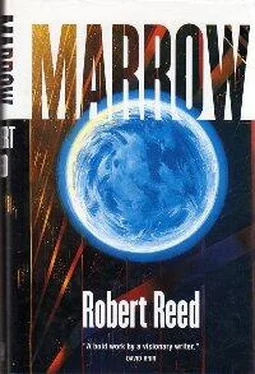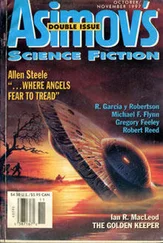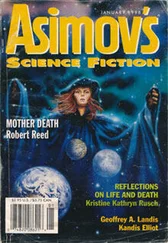Robert Reed - Marrow
Здесь есть возможность читать онлайн «Robert Reed - Marrow» весь текст электронной книги совершенно бесплатно (целиком полную версию без сокращений). В некоторых случаях можно слушать аудио, скачать через торрент в формате fb2 и присутствует краткое содержание. Год выпуска: 2000, ISBN: 2000, Издательство: Tor Books, Жанр: Фантастика и фэнтези, на английском языке. Описание произведения, (предисловие) а так же отзывы посетителей доступны на портале библиотеки ЛибКат.
- Название:Marrow
- Автор:
- Издательство:Tor Books
- Жанр:
- Год:2000
- ISBN:0-312-86801-4
- Рейтинг книги:5 / 5. Голосов: 1
-
Избранное:Добавить в избранное
- Отзывы:
-
Ваша оценка:
- 100
- 1
- 2
- 3
- 4
- 5
Marrow: краткое содержание, описание и аннотация
Предлагаем к чтению аннотацию, описание, краткое содержание или предисловие (зависит от того, что написал сам автор книги «Marrow»). Если вы не нашли необходимую информацию о книге — напишите в комментариях, мы постараемся отыскать её.
Marrow — читать онлайн бесплатно полную книгу (весь текст) целиком
Ниже представлен текст книги, разбитый по страницам. Система сохранения места последней прочитанной страницы, позволяет с удобством читать онлайн бесплатно книгу «Marrow», без необходимости каждый раз заново искать на чём Вы остановились. Поставьте закладку, и сможете в любой момент перейти на страницу, на которой закончили чтение.
Интервал:
Закладка:
She said it aloud, then whispered the rest of those incredible words.
“Proceed with your mission, with utmost caution, beginning immediately.”
It took a lot to astonish an old woman. Yet here was one old woman who felt astonished to the point of numbness, and perhaps a little afraid, not to mention incandescently happy to have this abrupt, utterly unexpected challenge.
Two
Remoras worked tirelessly to make Miocene feel ill at ease, and without exception, their best efforts failed. Today’s attempt was utterly typical. She was making one of the ritual tours of the outer hull. Her guide, a glancingly charming and notorious elder named Orleans, steered the skimmer across the ship’s leading face, passing as many markers and statues and tiny memorials as physically possible. He did it without subtlety or apology. What passed for a mouth kept smiling at the Submaster, and a gloved hand would gesture at each site, the deep wet voice reporting how many had died at this place and how many had been his good friends or members of his enormous, cantankerous family.
Miocene made no comment.
Her spare face wore an expression that might be confused for compassion, while her thoughts centered on those matters where she could actually accomplish genuine good.
“Twelve died here,” Orleans reported. Then later, “Fifteen here. Including a great-grandson of mine.”
Miocene wasn’t a fool. She knew Remoras lived a hard existence. She felt a measure of sympathy for their troubles. But there were many fine fat reasons not to waste a moment grieving for these supposed heroes.
“And here,” Orleans trumpeted, “the Black Nebula killed three whole teams. Fifty-three dead, in the space of a single year.”
The hull beneath them was in good repair. Wide stretches of fresh hyperfiber formed a bright, almost mirrored surface, reflecting the swirling colors of the ship’s shields. The three memorials were bone-colored spires no more than twenty meters tall—visible for an instant, then gone as the shuttle streaked past each one in the blink of an eye.
“We got too close to that nebula,” Orleans informed her. Miocene showed her feelings by closing her eyes.
Brazen like all Remoras, her guide ignored the simple warning. “I know the good reasons why,” he growled. “A lot of wealthy worlds near that nebula, and inside. We needed to pass close enough to lure new customers. After all, we’re a fifth of the way through our great voyage, and we still have empty berths and quotas to fill—”
“No,” Miocene interrupted. Then slowly, with a contemptuous sigh, she opened her eyes and stared at Orleans, telling him, “There is no such monster as a quota. Not officially, and not otherwise.”
“My mistake,” said Orleans. “Sorry.”
Yet the man’s expression seemed doubtful.
Dismissive, even.
But what did any Remoran face mean? What she saw was intentionally gruesome: the broad forehead was a waxy white with thick beads of grease aligned in neat rows. Where human eyes should have returned her gaze, there were twin pits filled with hair; each hair, she assumed, was photosensitive, all joined together as a kind of compound eye. If there was a nose, it was hidden. But the mouth was a wide rubbery affair, never able to close entirely. It was hanging agape now, so large that Miocene could count the big pseudoteeth and two blue tongues, and in the back of that yawning mouth, what seemed to be the white image of an old-fashioned human skull was plainly visible.
The rest of the Remoras body was hidden inside his lifesuit.
What it looked like was a mystery without solution. Remoras never removed their suits, even when they were alone with each other.
Yet Orleans was human. By law, he was a treasured member of the crew, and in keeping with his station, this human male was entrusted with jobs that demanded skill and a self-sacrificing duty.
Again, with an intentional gravity, Miocene told her subordinate, “There are no quotas.”
“My fault,” he replied. “Entirely, and always.”
The great mouth seemed to smile. Or was it a toothy grimace?
“And,” the Submaster continued, “there were future considerations at stake. A brief danger now is better than a prolonged distant one. Wouldn’t you agree?”
The hairs of each eye pulled closer together, as if squinting. Then the deep voice said, “No, frankly. I don’t agree.”
She said nothing. Waiting.
“What would be best,” Orleans informed her, “would be for us to get the flick out of this spiral arm, and away from every damned obstacle. That’s what would be best, sir. If you don’t mind my saying.”
She didn’t mind, no. By definition, an inconsequential sound can easily be ignored.
But this Remora was pressing her more than tradition allowed, and more than her nature could permit. She gazed across the bland landscape of hyperfiber, the very distant horizon perfectly flat, and the sky filled with swirling purples and magentas, the occasional burst of laser light visible as it passed through the ship’s shields. Then with a quiet, calculating rage, she told the Remora what he already knew.
“It’s your choice to live up here,” she said.
She said, “It’s your calling and your culture. You’re Remoran by choice, as I recall, and if you don’t want responsibility for your own decisions, perhaps I should take possession of your life for you. Is that what you want, Orleans?”
The hairy eyes pulled into hard little tufts. A dark voice asked, “What if I let you, madam? What would you do to me?”
“Take you below, then cut you out of your lifesuit. To begin with. Rehabilitate your body and your mangled genetics until you could pass for human. And then, to make you especially miserable, I would turn you into a captain. I’d give you my uniform and some real authority, plus my massive responsibilities. Including these occasional tours of the hull.”
The gruesome face was furious.
An indignant voice assured her, “It’s true what they say. You’ve got the ugliest soul of any of them!
Quietly and furiously, Miocene said, “Enough.”
She informed Orleans, “This tour is finished. Take me back to Port Erinidi. And in a straight line this time. If I see one more memorial, I promise, I’ll carve you out of that suit myself. Here, and now.”
In an accidental fashion, the Remoras were Miocenes creation.
Ages ago, as the Great Ship reached the dusty edge of the Milky Way, there was a critical need to repair the aged hull and protect it from future impacts.The work swamped the available machinery—shipborn and human-built. It was Miocene who suggested sending the human crew out into the hull. The dangers were obvious, and fickle. After billions of years of neglect, the electromagnetic shields and laser arrays were in shambles; repair teams could expect no protection from impacts and precious little warning. But Miocene created a system where no one was asked to take larger risks than anyone else. Gifted engineers and the highest captains served their mandatory time, dying with a laudable regularity. Her hope was to patch the deepest craters with a single warlike push , then the surviving engineers would automate every system, making it unnecessary for people ever to walk the hull again.
But human nature subverted her meticulous plans.
A low-ranking crew member would earn negative marks. They might be minor violations of dress, or moments of clear insubordination. Either way, those offenders could clean up their files by serving extra time on the hull. Miocene looked on it as an absolution, and she gladly sent a few souls ‘upstairs’. But a few captains confused the duty for a punishment, and over the course of a few centuries, they banished thousands of subordinates, sometimes for nothing worse than a surly word heard in passing.
Читать дальшеИнтервал:
Закладка:
Похожие книги на «Marrow»
Представляем Вашему вниманию похожие книги на «Marrow» списком для выбора. Мы отобрали схожую по названию и смыслу литературу в надежде предоставить читателям больше вариантов отыскать новые, интересные, ещё непрочитанные произведения.
Обсуждение, отзывы о книге «Marrow» и просто собственные мнения читателей. Оставьте ваши комментарии, напишите, что Вы думаете о произведении, его смысле или главных героях. Укажите что конкретно понравилось, а что нет, и почему Вы так считаете.












